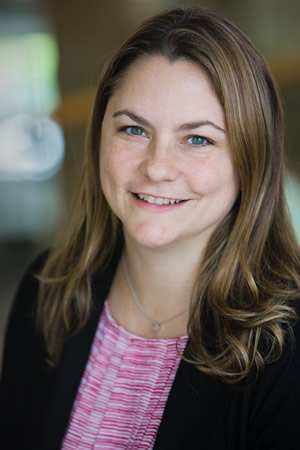Professor Christine DunhamBy Prof. Kristin Koutmou  Christine Dunham is an Associate Professor of Biochemistry at Emory University. She received her Ph.D. from the University of California Santa-Cruz where she studied the mechanism of the hammerhead ribozyme in the laboratory of Professor William G. Scott. As a post-doctoral fellow, Professor Dunham continued to pursue her interest in RNA catalysis, studying nature’s largest ribozyme, the ribosome, at the Division of Structural Biology at the MRC Laboratory of Molecular Biology with Professor Venki Ramakrishnan. She is currently most excited by her ongoing projects using biochemical and structural biology approaches to study “how RNA modifications control the mRNA frame, how mRNA itself regulates translation, and how RNA pieces derived from tRNAs and mRNAs can affect gene expression.” Professor Dunham’s work has been widely recognized, and she is the recipient of many awards including being named as Pew Scholar in the Biomedical Sciences, American Society of Biochemistry and Molecular Biology (ASBMB) Young Investigator, Burroughs Wellcome Investigator in the Pathogenesis of Infectious Diseases, and an NSF Early Career Development (CAREER) Award. Professor Dunham’s success comes in large part from her having the courage to follow her own scientific curiosity. “When I started my group over ten years ago, I focused on research questions I was passionate about. These questions were fundamental and perhaps not directly disease oriented (although I think our discoveries could be applicable in the future to understanding ribosome dysregulation and thus disease). As a faculty member in a medical school, this has meant I have felt somewhat outside of their interests because of a lack of disease focus. Nonetheless, I held firm in my lab’s focus because I am passionate about these questions.” She encourages young scientists to identify important questions that inspire them, rather than solely focusing on what others might find interesting. Professor Dunham also adds a “last bit of advice, persevere! An academic career is challenging, so remember to celebrate all successes no matter how small and have fun pursuing your research interests. I wish someone had reminded me of the latter bit after my second year as a faculty member.” Her personal experiences as a graduate student, post-doctoral fellow, and an assistant professor have given Professor Dunham a commitment to mentoring the next generation of scientists. “In Venki’s lab we tackled scientific challenges as a team, and this team mentality is something I attempt to replicate in my own lab. Of course, not everyone is working on the same question, however, the openness and willingness to help others in the lab, results in an incredibly generous lab environment. Mentoring is important and it is a feedback loop in my lab - everyone is mentored when they join and then they give back by mentoring others as they become more senior.” As she transitions to a more senior role in her department, Professor Dunham is working to thoughtfully “give back to the next generation.” She tells junior faculty that “finding colleagues who care about your success, that is, colleagues who will read your grants, papers, anything and provide honest feedback” is imperative to “successfully navigate an academic career. One would think this exists everywhere but it’s not true. I had this type of environment with a core group of senior colleagues in my department.” With this in mind, she is “extensively involved in the mentoring of junior faculty in my department, serving on their mentoring committees and providing feedback on their proposals, and manuscripts.”
Additionally, Professor Dunham notes the need for more diverse groups of scientists in senior leadership roles. “This has been said over and over but a lack of women faculty has been a challenge for me personally. I guess it was shocking for me to discover the lack of women faculty peers after having many women colleagues as a graduate student and a postdoc. It didn’t bother me at first as I was so focused on my research but as you see male colleagues promoted to leadership roles who decide university-wide directions, you start to realize that decisions made in the absence of diverse groups aren’t the most creative and best for the whole university. Women and people from underrepresented groups need to be part of these conversations. It is sometimes amazing to me that we still have to discuss this.” She encourages women to “seek out other junior women (if there are enough! There weren’t many in my university) or senior women faculty to informally discuss any challenges you may encounter. These interactions have been invaluable to me.” Professor Dunham has “always been interested in RNA-based research” and regularly attends the RNA Society meeting. Her first RNA Society meeting was in 2006 in Seattle as a postdoctoral fellow, and she recalls that “hearing Christine Guthrie talk about her challenges throughout her career was incredibly inspiring. I think this was the first time I ever heard any scientist—woman or man—discuss both scientific and personal struggles so honestly. I will never forget this moment.” Professor Dunham encourages young RNA scientists attending the meeting to “map out which talks and posters to attend beforehand, and reach out to faculty you are interested in meeting by email or Twitter. You think you may run into them at the meeting but it’s hard with so much exciting research going on.” Prof. Dunham’s favorite RNA is the tmRNA. “Most fascinating RNA ever. Bacteria are still cool you know!” She can be reached on Twitter @Dunham_Lab, or you can contact her at [email protected]. |
